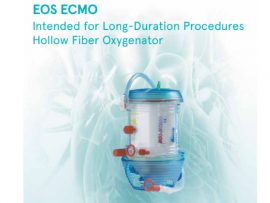Vamos caminhar juntos para descobrir seu caminho profissional!! Prof. Elio Carvalho é Biomédico, Microbiologista e Perfusionista pela Unicamp, CLAP e SBCEC. É perfusionista do Hospital de Clínicas da Unicamp e..
Read MoreAbstract Effect of Cardiopulmonary bypass on Lungs: organ damage during cardiac surgery has been primarily attributed to the use of CPB. Pulmonary function in patients after CPB is consistently altered..
Read MoreAbstract Background Extracorporeal circulation causes a systemic inflammatory response, that may cause postoperative haemodynamic instability and end-organ dysfunction. This study aimed to investigate the impact of minimal invasive extracorporeal circulation..
Read MoreAbstract Thrombotic complications during and after extracorporeal membrane oxygenation (ECMO) are commonly observed clinically. The incidences of cannula-associated deep vein thrombosis (CaDVT) post-ECMO support have predominantly focused on Caucasian demographics...
Read MoreAbstract Introduction The use of del Nido cardioplegia has increased in the adult cardiac surgery population. Centers have adopted the formula with a variety of circuit systems. This report includes..
Read MoreAbstract Thoracoabdominal normothermic regional perfusion (TA-NRP) is increasingly implemented in donation after circulatory determination of death (DCD). Thoracoabdominal normothermic regional perfusion allows thoracic and abdominal organs to be perfused with..
Read MoreAbstract Mechanical circulatory support (MCS) plays a significant role as a therapeutic option for severe heart failure, and its outcomes have been improving due to advancements in devices and management..
Read MoreAbstract Objectives Myocardial revascularisation and cardiopulmonary bypass (CPB) can cause ischaemia-reperfusion injury, leading to myocardial and other end-organ damage. Volatile anaesthetics protect the myocardium in experimental studies. However, there is uncertainty..
Read MoreAbstract Distance simulation is a method of health care training in which the learners and facilitators are in different physical locations. Although methods of distance simulation have existed in health..
Read MoreAbstract Introduction Medication errors are an unnecessary cost to a healthcare system and patients of a country. This review aimed to systematically identify published cost variables used to calculate the cost..
Read MoreAbstract Thermodilution methods to determine cardiac output (CO) may be affected by veno-venous extracorporeal membrane oxygenation (ECMO). We compared CO estimations by pulmonary arterial thermodilution using a pulmonary arterial catheter..
Read MoreAbstract Background: Extracorporeal membrane oxygenation (ECMO) represents a potentially lifesaving support for respiratory and/or circulatory failure but its availability is limited to larger medical centers. A well-organized regional ECMO center..
Read MoreAbstract Background Extracorporeal membrane oxygenation (ECMO) is increasingly being used for critically ill patients with cardiopulmonary failure. Air in the ECMO circuit is an emergency, a rare but fatal complication...
Read MoreAbstract Acute respiratory distress syndrome (ARDS) comprises 10–30% of critical care admissions worldwide []. ARDS outcomes have improved secondary to ventilatory strategies that may potentially mitigate ventilator-induced lung injury []...
Read MoreAbstract To the Editor, After more than a decade of focused research, significant advancements have been made in the technology of cardiopulmonary bypass perfusion (CPB) for Type A aortic dissection (TAAD). Notably, there has been..
Read MoreAbstract Stroke and intracranial hemorrhage (ICH) are serious complications that are difficult to manage during surgery for active infectious endocarditis (AIE). Relevant society guidelines still recommend delaying the cardiac surgery..
Read MoreAbstract Objectives Minimally invasive cardiac surgery techniques are increasingly used but have longer cardiopulmonary bypass time, which may increase inflammatory response and negatively affect coagulation. Our aim was to compare..
Read MoreAbstract Objectives The FUWAI-SAVE system is a modified low-priming cardiopulmonary bypass (CPB) system. The study aimed to explore whether the FUWAI-SAVE system can reduce the perioperative blood transfusion and its..
Read MoreAbstract Background Stroke affects surgical decision making and outcomes of neonatal cardiac surgery (CHS). We sought to assess the burden of stroke in this population from a large multicenter database...
Read MoreAbstract Background/aim: In this prospective observational study, our goal was to investigate the relationship between serum levels of oxidative stress (OS) parameters and regional cerebral oxygen saturation (rSO2 ) in..
Read MoreAbstract The development of extracorporeal life support technology has added a new dimension to the care of critically ill patients who fail conventional treatment options. Extracorporeal membrane oxygenation (ECMO)—specialized temporary..
Read MoreAbstract Background and Aims: The practice of intraoperative blood salvage and autotransfusion (IBSA) during deceased donor liver transplantation (DDLT) for hepatocellular carcinoma (HCC) can potentially reduce the need for allogeneic..
Read MoreAbstract Background Postoperative pneumonia (POP) is the most prevalent of all nosocomial infections in patients who underwent cardiac surgery. The aim of this study was to identify independent risk factors..
Read MoreAbstract Background We aimed to estimate the effect of extracorporeal cardiopulmonary resuscitation (ECPR) on neurological outcome and mortality, when compared to conventional cardiopulmonary resuscitation (CCPR), using an individual patient data..
Read MoreAbstract Introduction The trial hypothesized that minimally invasive extra-corporeal circulation (MiECC) reduces the risk of serious adverse events (SAEs) after cardiac surgery operations requiring extra-corporeal circulation without circulatory arrest. Methods..
Read MoreAbstract Introduction The use of cardiopulmonary resuscitation (ECPR) for refractory cardiac arrest is increasing globally. However, providing equity of access to all patients is challenging, and to date, access has been..
Read MoreAbstract We present the case of a 62-year-old man with severe coronary artery disease who presented to the hospital in refractory ventricular fibrillation cardiac arrest. He showed signs of life..
Read MoreAbstract In the initial phases of veno-venous extracorporeal membrane oxygenation (VV ECMO) support for severe acute respiratory distress syndrome (ARDS), ultraprotective controlled mechanical ventilation (CMV) is typically employed to limit..
Read MoreAbstract Background To assess whether retrograde cerebral perfusion reduces neurological injury and mortality in patients undergoing surgery for acute type A aortic dissection. Methods Single-center, retrospective, observational study including all..
Read MoreAbstract Background Cerebral perfusion may change depending on arterial cannulation site and may affect the incidenceof neurologic adverse events in post‑cardiotomy extracorporeal life support (ECLS). The current study comparespatients’ neurologic..
Read More























